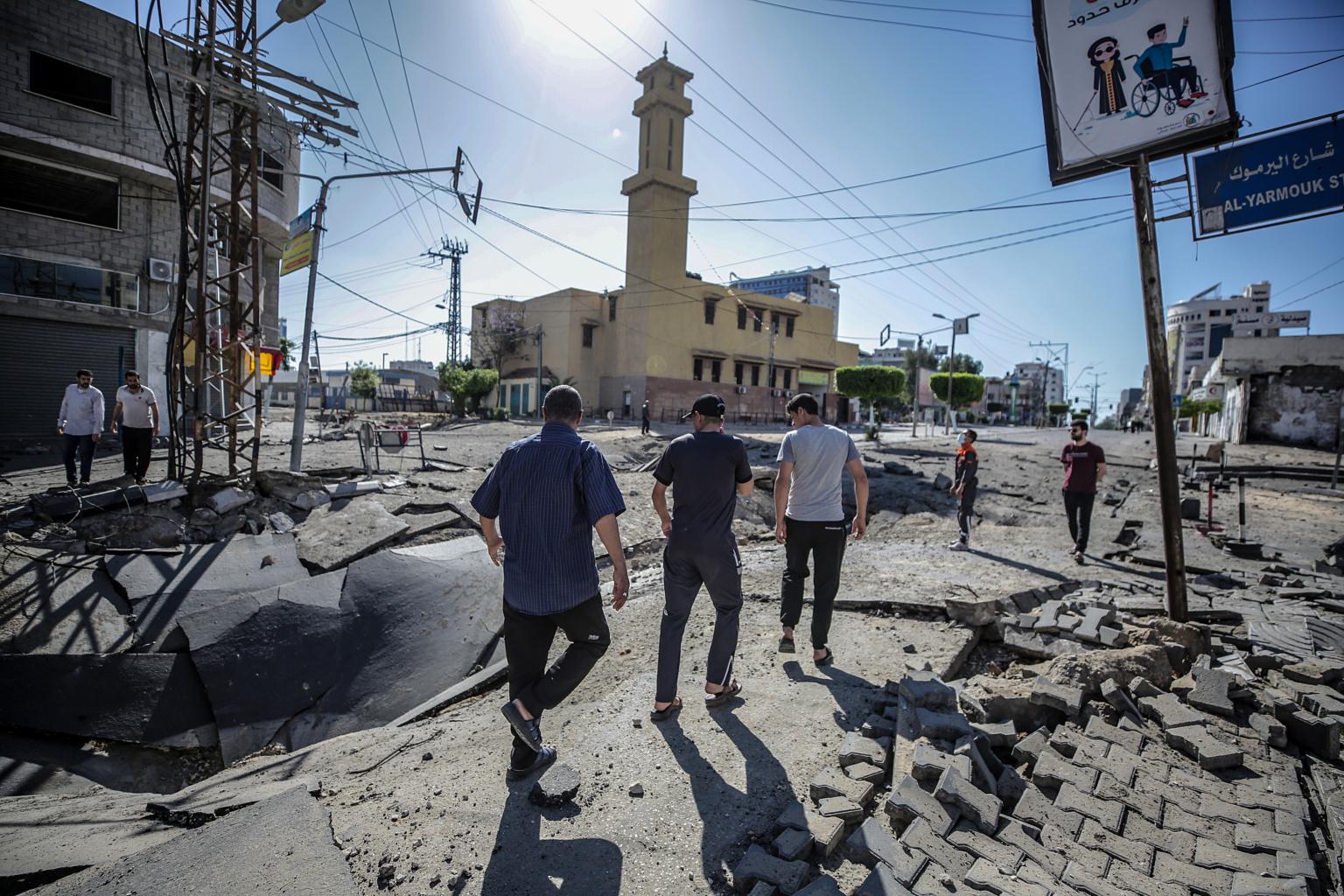UN Security Council to meet on Sunday about Israel, Gaza as Biden says effort to restore calm is 'work in progress'
Sign up now: Get ST's newsletters delivered to your inbox

Palestinians are seen inspecting a damaged street following an Israeli air strike in Gaza City on May 13, 2021.
PHOTO: EPA-EFE
WASHINGTON/NEW YORK (REUTERS) - The UN Security Council will publicly discuss the worsening violence between Israel and Palestinian militants on Sunday (May 16), diplomats said, reaching a compromise over US objections to a meeting on Friday.
Diplomats said the United States, a close ally of Israel, had initially suggested a virtual public meeting could be held on Tuesday.
US Secretary of State Antony Blinken said on Thursday he hoped waiting a few days would allow for "diplomacy to have some effect and to see if indeed we get a real de-escalation," adding that Washington was "open to and supportive of a discussion, an open discussion, at the United Nations."
Hostilities entered their fifth day on Friday, with no sign of abating. Israel fired artillery and mounted more air strikes against Palestinian militants in the Gaza Strip amid constant rocket fire deep into Israel's commercial centre.
The 15-member council has met privately twice this week about the worst hostilities in the region in years, but has so far been unable to agree on a public statement, diplomats said.
Such statements are agreed to by consensus, and the United States did not believe it would be helpful, they said.
All council members also have to agree to a meeting under rules guiding the body's virtual operations during the Covid-19 pandemic.
Israel unleashed its offensive on militants in Gaza after Hamas fired rockets at Jerusalem and Tel Aviv in retaliation for Israeli police clashes with Palestinians near al-Aqsa mosque in East Jerusalem during the Muslim fasting month of Ramadan.
Worried that hostilities could spiral out of control, the United States is sending an envoy to the region.
"The US will continue to actively engage in diplomacy at the highest levels to try to de-escalate tensions," US Ambassador to the United Nations Linda Thomas-Greenfield posted on Twitter after the Sunday meeting was agreed.
Truce efforts by Egypt, Qatar and the United Nations have so far offered no sign of progress.
President Joe Biden said on Thursday he is pressing for a halt to violence between Israelis and Palestinians, but US officials say they are resigned to the conflict continuing for some days to come.
Since taking office in January, Mr Biden's foreign policy moves have largely been centred on China, Russia and Iran.
The sharp escalation in violence between Israel and the Palestinian territories and a mounting death toll have forced the Democrat to launch a diplomatic effort aimed at restoring calm in a volatile region.
Mr Blinken spoke by phone with Palestinian President Mahmoud Abbas on Wednesday, but US officials said Mr Abbas seems either unable or unwilling to rein in Hamas-led rocket attacks on Israeli targets.
As a consequence, the Biden administration has reached out to a number of regional Arab states to get them to exert influence on Hamas - labeled a terrorist organisation by Washington - to stop the violence.
The US strategy has been a basic one: Get the violence to stop, and restore what officials called a sustainable calm, but even that has been elusive.
Mr Biden told reporters on Thursday that "there has not been a significant overreaction" by the Israelis to the attacks.
"The question is how they get to a point where there is a significant reduction in the attacks, particularly the rocket attacks that are indiscriminately fired into population centres," he said. "It's a work in progress right now."
US officials are realistic that the violence is likely to persist if not intensify over the next couple of days, a US official said.
Amid calls for the United States to do more and for Mr Biden to step in more directly, it is unclear how the President could prevail on both sides in the protracted conflict he has tracked for decades as a US senator and then vice-president.
Washington does not appear to have a "clear strategy" on how to broker a truce and "that is the real problem," said a senior Arab diplomat, speaking on condition of anonymity.
"Yes, it's a crisis, but it doesn't seem to me like everyone's running around like chickens with their heads cut off," said Jon Alterman, a former State Department official who is now director of the Middle East Program at the Center for Strategic and International Studies in Washington.


